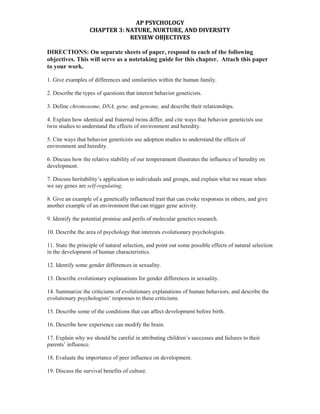
Chapter 3 review qs
- 1. DIRECTIONS: On separate sheets of paper, respond to each of the following objectives. This will serve as a notetaking guide for this chapter. Attach this paper to your work. <br />1. Give examples of differences and similarities within the human family.<br />2. Describe the types of questions that interest behavior geneticists.<br />3. Define chromosome, DNA, gene, and genome, and describe their relationships.<br />4. Explain how identical and fraternal twins differ, and cite ways that behavior geneticists use twin studies to understand the effects of environment and heredity.<br />5. Cite ways that behavior geneticists use adoption studies to understand the effects of environment and heredity.<br />6. Discuss how the relative stability of our temperament illustrates the influence of heredity on development.<br />7. Discuss heritability’s application to individuals and groups, and explain what we mean when we say genes are self-regulating.<br />8. Give an example of a genetically influenced trait that can evoke responses in others, and give another example of an environment that can trigger gene activity.<br />9. Identify the potential promise and perils of molecular genetics research.<br />10. Describe the area of psychology that interests evolutionary psychologists.<br />11. State the principle of natural selection, and point out some possible effects of natural selection in the development of human characteristics.<br />12. Identify some gender differences in sexuality.<br />13. Describe evolutionary explanations for gender differences in sexuality.<br />14. Summarize the criticisms of evolutionary explanations of human behaviors, and describe the evolutionary psychologists’ responses to these criticisms.<br />15. Describe some of the conditions that can affect development before birth.<br />16. Describe how experience can modify the brain.<br />17. Explain why we should be careful in attributing children’s successes and failures to their parents’ influence.<br />18. Evaluate the importance of peer influence on development.<br />19. Discuss the survival benefits of culture.<br />20. Describe some ways that cultures differ.<br />21. Explain why changes in the human gene pool cannot account for culture change over time.<br />22. Identify some ways a primarily individualist culture differs from a primarily collectivist culture, and compare their effects on personal identity.<br />23. Describe some ways that child-rearing differs in individualist and collectivist cultures. <br />24. Describe some ways that humans are similar, despite their cultural differences. <br />25. Identify some biological and psychological differences between males and females. <br />26. Summarize the gender gap in aggression.<br />27. Describe some gender differences in social power.<br />28. Discuss gender differences in connectedness, or the ability to “tend and befriend.”<br />29. Explain how biological sex is determined, and describe the role of sex hormones in biological development and gender differences.<br />30. Discuss the relative importance of environment on the development of gender roles, and describe two theories of gender-typing.<br />31. Describe the biopsychosocial approach to development.<br />
